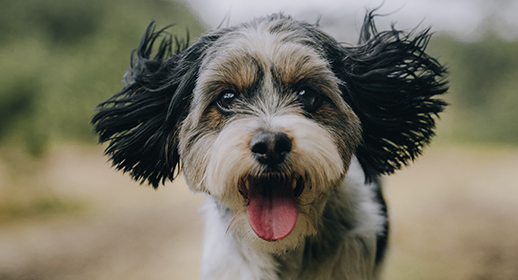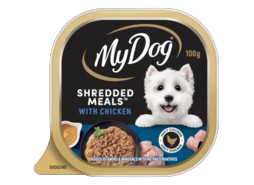- Home
- Dispelling Dog Food Myths


Photo by Damian Barczak
Dispelling Dog Food Myths
When it comes to our dogs’ diets, there is a great deal of conflicting information and advice. The problem is that not all of it is true or backed by vets, which means it can sometimes be tricky to tell the difference between what is fact, what is safe and what is a dog food myth.
We all want the best for our furry friends, so it’s important to debunk some of the most common dog food myths, so you can focus on providing them with healthy nutrition and avoid potentially harmful habits.
Why these myths have come to exist
Misinformation about dog food generally comes from a good place, as it can often be circulated by pet parents exploring ways to provide their beloved companions with the best diet. Unfortunately, it can breed confusion and, in some cases, lead to dogs missing out on essential nutrients or even eating things they really shouldn’t.
While some information is based on an element of truth, it’s often miscommunicated or misconstrued. So, if you’re unsure about something you’ve read, be sure to do some further research using trusted sources.
Common myths
Myth: Dogs can’t eat pork
Pork isn’t as commonly found in dog food as other meats, like chicken and beef, and many people think this is because it's toxic or too high in fat. In actual fact, unprocessed pork is lower in fat than some other commonly used meats and is perfectly healthy for dogs to consume, as long as it’s cooked properly. Raw or undercooked pork isn’t safe for dogs to consume, as it can pass on a parasitic infection called trichinosis.
Myth: Dogs are carnivores
While dogs may be descendants of wolves, this doesn’t mean they need to eat a purely carnivorous diet. They’ve evolved to develop the ability to digest carbohydrates as well as protein, making them omnivores. This is why you’ll also find ingredients like grains and vegetables in many dog foods. If your dog loves the meaty taste and texture, a high-quality wet food that combines meat with other goodness might be best for them.
Myth: Homemade dog food is healthiest for your dog
Unless the person whipping up the homemade dog food is a qualified pet nutritionist, it’s not necessarily going to be healthier than store-bought food. In fact, it might be missing essential nutrients, such as zinc, choline, copper, and omega-3 fatty acids. A complete and balanced dog food, such as the My Dog™ product range, not only contains high-quality protein and plant-based ingredients but is also enriched with vitamins and minerals to ensure your pooch gets all the nutrients they need.
Myth: High-protein diets cause kidney failure
While a dog with kidney disease may need to be fed a specially formulated diet to help manage their condition, there’s little to suggest a healthy dog will develop issues with their kidneys from eating a high protein diet. This said, unless your pooch is a working dog or lives a particularly active lifestyle, they shouldn’t need extra protein in their diet. All protein is broken down during digestion, and if your dog consumes more protein than they can use, their body can’t store the extra. Instead, it’s excreted in the urine and the extra calories from the protein will be stored as fat and could lead to weight gain.
Myth: Raw diets are the best for dogs
While dogs can digest raw meat, it doesn't come without its risks, as it can contain pathogens and bacteria that can be harmful to your dog’s health. For this reason, many vets discourage pet parents from feeding their dogs raw or undercooked protein.
Myth: Grains are bad for your dog
Occasionally dogs can develop allergies to grains, but most won’t have an issue having some grains in their diet. Grains are highly nutritious for your pup when eaten in moderation and are a great source of energy, fibre, vitamins, minerals, fatty acids, and plant protein.
Myth: Raw eggs will give your dog a shiny coat
Eggs contain a high level of protein, fat, and vitamins, which supports healthy fur and skin, but there’s no evidence that feeding your dog raw egg will have any benefits. It also puts your dog at risk of contracting salmonella. If you want to treat your dog to eggs, the best way to feed them an egg is boiled or scrambled without any butter or oil. Just make sure it’s kept as an occasional treat, as they’re high in fat.
Making the best choices for your dog
With so much contradictory information out there, it can be confusing trying to decide what’s best for your pooch. Generally speaking, as long as your furry friend doesn’t have any specific dietary requirements, a high-quality dog food will provide them with the daily nutrition they need. When it comes to table scraps, always check with a trusted source if the food is safe for your pup, as some human foods are toxic for dogs. When in doubt, the best thing to do is to have a chat with your vet about your pup’s nutrition.
While there are great sources of advice regarding your beloved pet, it’s important that you’re aware of the misinformation out there and, when in doubt, turn to trusted sources. We want the best for pet parents and their furry friends, so you can find more tips and advice on our blog.
© 2023 Mars or Affiliates.
Buy online
Click to buy from any of the retailers below





